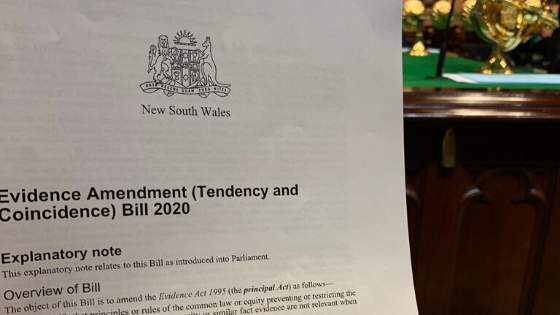As a response to the Royal Commission into Institutional Responses to Child Sexual Abuse, the Evidence Amendment (Tendency and Coincidence) Act 2020 will make a number of significant amendments to the Evidence Act 1995 (NSW).
What is ‘tendency evidence’?
Tendency evidence which means that evidence or the character, reputation or conduct of a person to prove that a person has or had a tendency to act in a particular way, or to have a particular state of mind.
This type of evidence may be considered admissible if the party seeking to adduce the evidence in the proceedings gives the other party reasonable notice in writing of the intention to adduce the evidence and if the court believes that the evidence will have a “significant probative value” in the matter.
What changes are being made to the Evidence Act?
This amendment will see the inclusion of a new section to the evidence, s97A, relating to the admissibility of tendency evidence in proceedings involving child sexual offences. This section will apply to criminal proceedings in which the commission by the defendant of an act that constitutes, or may constitute, a child sexual offence is a fact in issue.
What is a ‘child sexual offence’?
A ‘child sexual offence’ is defined as:
- an offence against, or arising under, a law of this State involving sexual intercourse with, or any other sexual offence against, a person who was a child at the time of the offence, or
- an offence against, or arising under, a law of this State involving an unlawful sexual act with, or directed towards, a person who was a child at the time of the offence, or
- an offence against, or arising under, a law of the Commonwealth, another State, a Territory or a foreign country that, if committed in this State, would have been an offence of a kind referred to in paragraph (a) or (b).
However, this does not include the conduct of a person that has ceased to be an offence since the time when the person engaged in the conduct.
Key Takeaways
- NSW is considering decriminalizing minor illicit drug possession, influenced by recommendations from an inquiry on the drug ice and music festival deaths.
- This move indicates a shift towards reducing penalties for small amounts but stops short of full decriminalization.
- Penalties currently vary by drug and amount, with the law distinguishing between quantities for different purposes.
- Police discretion, such as on-the-spot fines and the Cannabis Cautioning Scheme, highlights a move towards more lenient approaches for personal use.
How does this amendment operate in practice?
In prosecutions relating to a ‘child sexual offence’ tendency evidence showing a tendency to have a sexual interest in a child or children and/or a tendency to act upon such an interest will be presumed to have ‘significant probative value for the purposes of sections 97(1)(b) and 101(2)’ – unless the court is satisfied that there are ‘sufficient grounds’ to determine that it does not have significant probative value (s 97A(4)).
In deciding whether there are ‘sufficient grounds’ to determine that the tendency evidence does not have significant probative value, the court is not to take into account a number of specified matters ‘unless the court considers there are exceptional circumstances in relation to those matters (whether considered individually or in combination) to warrant taking them into account’ (s 97A(5)).
The amendments will apply to proceedings the hearing of which begin after the commencement of the amending Act, with the amendments set to commence on 1 July 2020.
If you or someone you know needs advice or representation for an alleged criminal offence, contact the team at Hamilton Janke Lawyer 24 hours a day, seven days a week by calling 4038 1666.
Written By

James Janke
James Janke is founding partner at Hamilton Janke Lawyers, and has more then decade of experience as a Criminal Defence Lawyer. Admitted to both the Supreme Court of New South Wales and High Court of Australia




